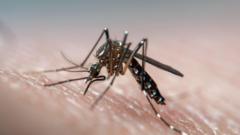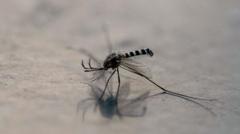Scientists at the University of California, Irvine have pioneered a unique approach to tackling the spread of dengue, Zika, and other diseases transmitted by mosquitoes. By genetically modifying male Aedes aegypti mosquitoes to be deaf, they effectively halted the mating process, which is crucial for the population's proliferation. These modified males were unable to detect the sound of female wingbeats, a vital component of their mating strategy, resulting in a significant reduction in fertilization rates.
Deaf Mosquitoes: A Novel Strategy to Combat Dengue and Zika

Deaf Mosquitoes: A Novel Strategy to Combat Dengue and Zika
Researchers introduce a groundbreaking method of reducing mosquito populations by rendering male insects deaf, disrupting their mating rituals and combatting mosquito-borne diseases.
The study, published in the journal PNAS, revealed that the genetic alteration involved a protein known as trpVa, essential for sound detection in mosquitoes. In experiments, these modified males remained completely ineffectual in mate selection, spending three days in the same enclosure without mating success. Meanwhile, their wild counterparts actively pursued and fertilized eggs of nearly all the females.
Dr. Joerg Albert, a specialist in mosquito mating from the University of Oldenburg, praised the research, indicating the potential for sound manipulation in mosquito control. He cautioned, however, that while this method could significantly reduce species populations, its ecological impacts must also be considered, given that mosquitoes play a role in the food chain and some serve as pollinators.
Furthermore, researchers are also looking into alternative strategies, such as releasing sterile males in areas affected by mosquito-borne diseases. As these innovative methods unfold, they offer new hope in the global fight against the health threats posed by mosquitoes.
Dr. Joerg Albert, a specialist in mosquito mating from the University of Oldenburg, praised the research, indicating the potential for sound manipulation in mosquito control. He cautioned, however, that while this method could significantly reduce species populations, its ecological impacts must also be considered, given that mosquitoes play a role in the food chain and some serve as pollinators.
Furthermore, researchers are also looking into alternative strategies, such as releasing sterile males in areas affected by mosquito-borne diseases. As these innovative methods unfold, they offer new hope in the global fight against the health threats posed by mosquitoes.





